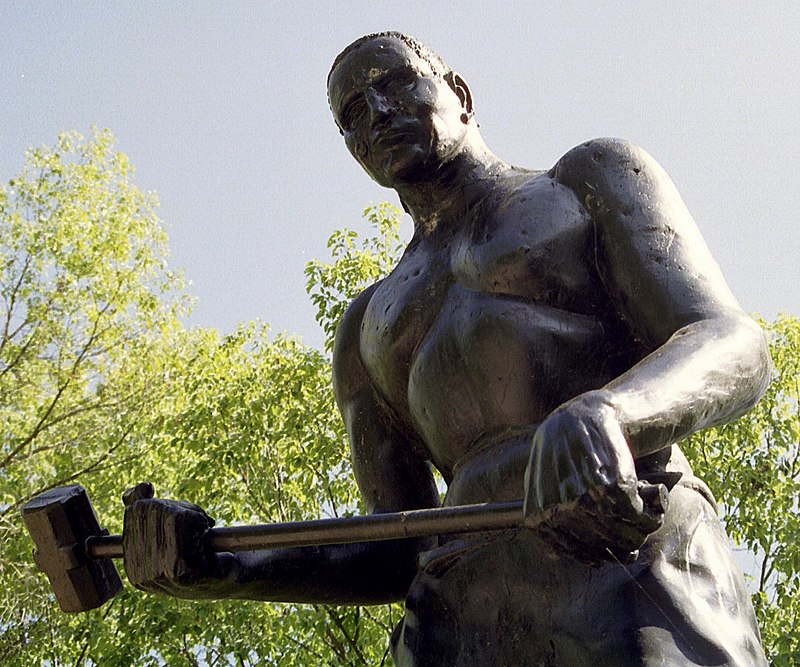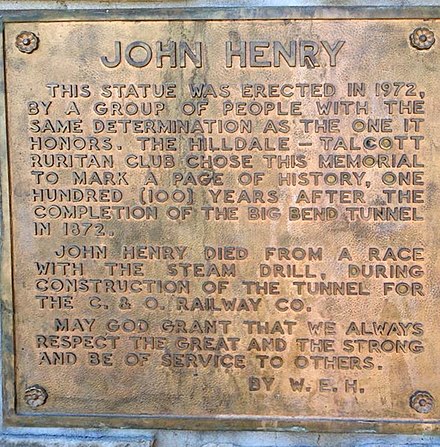
Railroad Work Songs (Continued)
The "Buckingham Lining Bar Gang Work Song" is another excellent example of a railroad work song. In this video presentation the men visually show how this type of work song keeps all the men working together in unison. One man who defiantly leads out makes the call which is followed by the rest of the group who shake the railroad bars gently back into a straight line.

Buckingham Lining Bar Gang work songs
The documentary The Buckingham Lining Bar Gang Extended Documentary ![]() SIDE NOTEThe Buckingham Lining Bar Gang of Buckingham County, Virginia, reenacts the work of lining track as it was done in 'bygone days.' The gang demonstrates how 'call and response' work songs were used as cadence to push railroad tracks into proper alignment. is a must-see for the student of work songs. It puts the history of the railroad work song into perspective. The Buckingham Lining Bar Gang of Buckingham County, Virginia, reenacts the work involved in lining track in "bygone days." The gang demonstrates how call-and-response work songs were used as cadence to push railroad tracks into proper alignment. The men also show the old methods of rail spike driving and railroad tools of a former time.
SIDE NOTEThe Buckingham Lining Bar Gang of Buckingham County, Virginia, reenacts the work of lining track as it was done in 'bygone days.' The gang demonstrates how 'call and response' work songs were used as cadence to push railroad tracks into proper alignment. is a must-see for the student of work songs. It puts the history of the railroad work song into perspective. The Buckingham Lining Bar Gang of Buckingham County, Virginia, reenacts the work involved in lining track in "bygone days." The gang demonstrates how call-and-response work songs were used as cadence to push railroad tracks into proper alignment. The men also show the old methods of rail spike driving and railroad tools of a former time.

Buckingham Lining Bar Gang
One of the best known of these songs, "John Henry", celebrated the Herculean feats of a Black steel driver, whose exploits made him a folk hero as he beat the machine (the steam drill used to build train tunnels) and in so doing reaffirmed both his racial identity and his right to work. Portia Maultsby writes:
Songs celebrating his exploits were already widespread in the early 1880s and continued to be sung well into the next century. Fundamental to an understanding of John Henry's significance is the economic plight of Black farmers and workers who faced competition from the growing mechanization represented in 'John Henry' by the stream drill. 'Dat steam drillers here, /Here a good man to rob,' John Henry announces as he determines to engage the machine in a contest to see if with his hammer he could drive steel drills into the rock more quickly and deeply. As he prophesies his triumph over the steam drill comes at the cost of his life. 'A man ain't nothing but a man,' he tells his captain, 'And before I'll be governed by this old steam drill,/ Lawd, I'll die with the hammer in my hand'
Maultsby 2017, 339
John Henry's longevity in the Black song was due to the fact that he became a culture hero: a representative figure whose life and struggle are symbolic of the struggle of the worker against the machine, individual against society, the lowly against the powerful, Black against White. Black workers saw in the death of John Henry not a defeat but a challenge:
This Old Hammer
This old hammer
Killed John Henry
Can't kill me, Lord,
Can't kill me
(Maultsby 2017, 339)
The development of the transcontinental railroad in the mid-nineteenth century brought with it the need for many skilled workers, including the need for the Black laborers. Their knowledge and skill over time made them indispensable to maintaining track. Along with maintaining track came the many work songs that allowed lining gang to work as a unified team. By the mid-1960's most track lining work became mechanized which brought an end to this profession.
For more context, watch the short film John Henry and the Railroad: The True Tall Tale.

John Henry and the Railroad
Gale P. Jackson
Work songs document the central experience in the lives of most Africans in the early history of the Americas who worked 'from sun up until sundown,' recognized the true extent of their worth, and despite the pervasive and horrific violence, brutality, and trauma of enslavement, drew sustenance from their own strength and accomplishments.
Frederick Douglass
They who study mankind with a whip in their hands will always go wrong.






